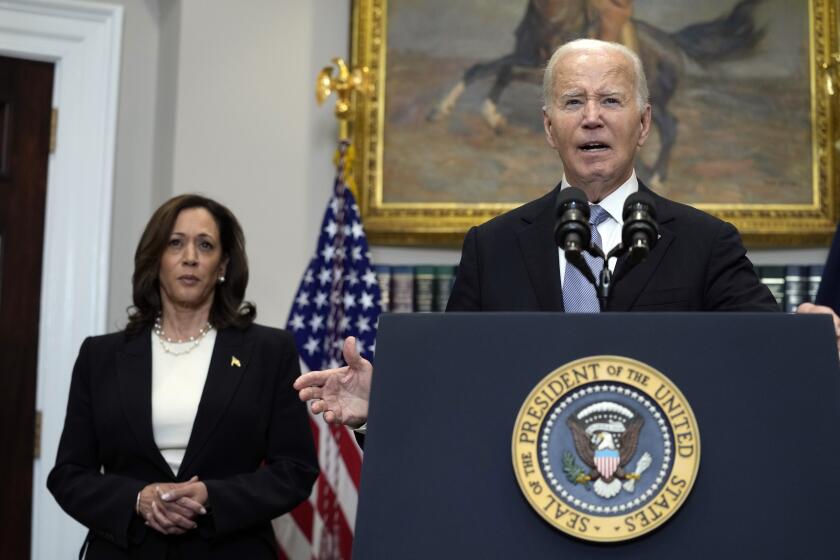Editorial: Make a deal to bring Edward Snowden home

Edward Snowden, the former National Security Agency contractor who revealed the details of U.S. electronic surveillance programs — including the bulk collection of millions of Americans’ telephone records, a practice Congress later ended — is in the news again.
Three years after he took refuge in Russia rather than return home to face charges that he had violated the Espionage Act, Snowden is the subject of an admiring film directed by Oliver Stone. Not so coincidentally, Snowden’s lawyers and human-rights groups have launched a campaign to persuade President Obama to grant him a pardon.
In a recent op-ed in The Times, Anthony Romero, the executive director of the American Civil Liberties Union, listed the positive consequences of Snowden’s actions: “In response to an ACLU lawsuit, a federal appeals court found the NSA’s mass phone surveillance program illegal. Congress passed an intelligence reform bill restricting the NSA’s authority for the first time in 40 years. Polls have shown a sea change in how the public views online privacy.”
Much of what Snowden revealed exposed intrusions on the privacy of American citizens.
Much of what Snowden revealed exposed intrusions on the privacy of American citizens. In addition to the mass collection of information about the source, destination and duration of telephone calls, he unearthed a program called PRISM that targeted the communications of foreigners outside the United States and also “incidentally” captured the content of their conversations with Americans.
The problem is that Snowden also revealed intelligence activities that didn’t impinge on the privacy of Americans. That includes information about U.S. surveillance operations in Berlin and a document showing that the NSA had intercepted the communications of then-Russian President Dmitry Medvedev during a visit to Britain.
That’s why the effort to win a pardon for Snowden has faced a powerful pushback from both Democrats and Republicans on the House Intelligence Committee. In a letter urging Obama not to grant a pardon, committee members say that Snowden is a criminal, not a whistleblower or a patriot, and they argue that the vast majority of the documents he removed from government files “had nothing to do with programs impacting individual privacy interests, but instead pertain to military, defense, and intelligence programs of great interest to America’s enemies.” While lawmakers may be exaggerating the damage Snowden’s leaks did to the nation’s ability to gather foreign intelligence, Snowden’s defenders can’t credibly argue that his disclosure of sources and methods of intelligence collection had no adverse effect.
The last time this page considered the question of what should happen to Snowden, we acknowledged that he had performed a public service in revealing the fact that the government, under a strained and secret interpretation of the Patriot Act, was vacuuming up and storing millions of Americans’ telephone records. But we also asserted that a pardon was premature and that he should return to the United States to face the charges against him and make a case for leniency.
A presidential pardon at this point seems — even according to Snowden’s supporters — highly unlikely. But we believe Snowden has a case for leniency, based not only on his motives but also on the fact that his disclosures brought to light practices that eventually were repudiated.
It would be difficult for him to make that case to a jury, however, in a trial on the serious charges that have been brought against him — two of them violations of the Espionage Act that could result in lengthy prison terms if Snowden were convicted. Based on past judicial precedent, Snowden would not be allowed to defend himself by arguing that he thought the surveillance programs he objected to were immoral or unconstitutional.
So the administration should take a different route: striking an agreement in which Snowden would plead guilty to a lesser offense related to the disclosure of classified material.
In the past, Snowden has suggested he might be willing to serve some time in prison as a condition of returning to the United States. Allowing him to plead guilty to a misdemeanor offense of mishandling classified information, carrying a sentence of a year or less, would hold him responsible for violating the law; but it also would reflect the fact that, in the words of former Atty. Gen. Eric H. Holder Jr., Snowden’s actions “spurred a necessary debate.”
Follow the Opinion section on Twitter @latimesopinion and Facebook
More to Read
A cure for the common opinion
Get thought-provoking perspectives with our weekly newsletter.
You may occasionally receive promotional content from the Los Angeles Times.






